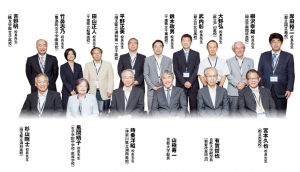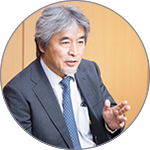XNUMX: About university selection based on deviation value
Yamagiwa: Many students choose universities and faculties based on deviations rather than what they want to do.There is also the influence of the prep school.This may be especially true for older students, but I would like to ask you how you are being taught.
Kishida: Two-thirds of the enrollees at our school come in for school festivals, and the remaining one-third come in for club activities.
Kazama: Many of the reasons for aspirations say that I was attracted to the liveliness and energy of the students at the Magnolia Festival (cultural festival).
Tayama: As career guidance, we have various universities and graduates come to talk.In addition, the students who graduated this year made a "desired school declaration" at the initiative of the grade chief in the winter of the second year, but they are instructing them to choose a university / faculty by carefully considering what they are learning. About XNUMX% are ronin, and many go to a nearby prep school.It may not be possible to say that there is no effect, but from this time on, I will visit the school by issuing a survey.Many of the graduates come to the Career Guidance Office to report and consult with them, and it seems that they often talk with their grade teachers and homeroom teachers.
Sugiyama: Many high schools are now focusing on career education.At our school, we also carry out "academic research", go to university tours, and invite guests from various fields to think about work and profession.As part of that, I also do job shadowing, and recently, with the cooperation of OB Dr. Atsushi Amano, I gave the students a work experience at a university hospital.The idea that he becomes a doctor because he has good grades in studying is strange.Also, the doctor thought that even if he was good at surgery, he had to heal people's hearts, and he gave me three days of guidance so that he could fully experience the work of a doctor in high school.Start by talking to the patient before surgery, show all the surgery and how the patient has healed after surgery, and say, "Are you ready to become a doctor? If not, stop." He also sprinkled it.I do not deny deciding on my academic ability, but basically I want to make a career choice by considering what I want to do and how I will contribute to society.
Yamagiwa: There are certainly problems with going on to medical school.The medical school has experiments and practical training, and the curriculum is calculated back from the national examination and is very tight.There are so many classes in the summer that I have almost no holidays, so if I don't have a good image from high school, there will be cases where I can't keep up.At the Faculty of Medicine of our university, doctors also conduct interviews to drop ineligible students because they take care of human life.
Ohno: There are 10 to 20 medical school aspirants every year, so I give guidance to the medical school and invite doctors to talk to me.The first thing the instructors say is that doctors may be financially fortunate to some extent, but not only is it difficult to get in, but it's also hard to get in.Studying for the national examination is difficult, and residents are not easy.Even if you become a full-fledged person, you will be left behind if you neglect to study.Clinicians may be awakened by an emergency even if they are sleeping.I have to work unless I have a passion to cure a sick person and to see the happy faces of myself and my family.However, since the parents' consciousness is a little different, I also invite doctors and graduates studying at the medical school to talk.There are quite a few hospitals that let you experience it now.Depending on the hospital, with the patient's permission, they will show you where to sew from behind.
By the way, I don't think that all the students at each school have a detailed course from the time they enter, but at Kyoto University, where there are different departments for entrance exams, how much can you change your course after admission?You can choose because the University of Tokyo has a lot of progress and is not clearly decided.
Yamagiwa: There is no problem because the Faculty of Science is a group.The department of the Faculty of Engineering is fixed, but there is also a system called a transfer department, so it is possible to change course.The transfer department is not easy because it comes with the grades of the entrance examination.Since the Faculty of Comprehensive Human Sciences has science and humanities, it is not so difficult to change after entering. Some students are in their second year and change from other faculties.
Morikami: What percentage will it change?
Ariga: In the grade, 20 or 30%, XNUMX to XNUMX people.
Toward reform of university entrance examinations
Yamagiwa: Universities overseas, especially in Europe, have a system called the Bologna Process, which allows you to change universities after enrollment.Students can travel to various universities with the results of standard exams in each country.Of course, mobility is guaranteed even within the same university.In Japan, there are barriers between universities and between faculties in general universities, and it was not considered to overcome them in the first place, so it is not easy to improve mobility.
The high school simultaneous test that is currently being discussed was originally started and the motive for its introduction was that a unified test should be established in Japan as a country that objectively evaluates the academic ability of high school students, following Europe and the United States. It is in.In Japan, it is the principal who is responsible for quality assurance of each school's education, which is the final judgment of high school students' grades.In the case of recommended admission, the university refers to it when selecting enrollees, but there is a problem that the standards differ for each high school.The current basic stance of the Ministry of Education, Culture, Sports, Science and Technology is to standardize it.
Kazama: I don't think we can talk about it in the same way as in Europe because the United States and Japan are becoming popular.In Japan, the majority of high school graduates, about 80%, now go to college or vocational school.In Europe, there are 10 to 20% of countries.I think that it is possible to walk between universities if you pass Abitua (Germany) or A level (UK) because the social structure itself is a system that can accept such things.In Japan, where there is a tendency to go to university, it may not be like Europe.
Yamagiwa: In both France and Germany, tuition fees are guaranteed by the state.Until recently, that was the case in England.Instead, international students are forced to pay a very high monthly fee.The United States is expensive, but the state has a high percentage of scholarships and is exempt from tuition.There are many such places in private schools.In Japan, national and private aid is different, and private is 75%.Since the mission of the university is different in the first place, it may be necessary to consider not only the problem of mobility but also the ideal way of simultaneous testing.Finally, I would like to hear the opinions of the teachers on this point (continued).
Juichi Yamagiwa
Graduated from Faculty of Science, Kyoto University in March 1975
March 1977 Completed Master's Program, Graduate School of Science, Kyoto University
March 1980 Kyoto University Graduate School of Science Doctoral Program Research Guidance Certification
May 1980 Dropped out of the doctoral program at the Graduate School of Science, Kyoto University
June 1980, 6 Japan Society for the Promotion of Science Encouragement Researcher
April 1982, 4 Kyoto University Trainee
January 1983, 1 Research Fellow, Japan Monkey Center
July 1988, 7 Assistant Professor, Primate Research Institute, Kyoto University
January 1998, 1 Associate Professor, Graduate School of Science, Kyoto University
July 2002, 7 Professor, Graduate School of Science, Kyoto University
April 2009, 4 Councilor, Education and Research Council, Kyoto University (until March 1, 2011)
April 2011, 4 Dean of Graduate School of Science, Kyoto University, Dean of Faculty of Science (until March 1, 2013)
April 2012, 4 Member of the Kyoto University Management Council (until March 1, 2013)
Incumbent from October 2014, 10
Born in Tokyo Metropolitan National High School
(In the next issue, we will post the opinions of each principal.)



